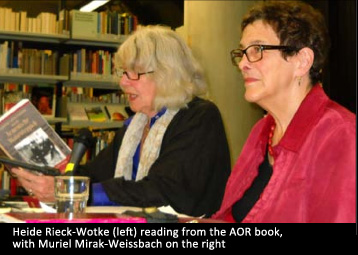Much Ado About a Little Book
Oct/10/2014 Archived in:Armenian Genocide
By Muriel Mirak-Weissbach
Special to the Mirror-Spectator
BOCHUM, Germany — That little book by Dr. Hagop Martin Deranian continues to provoke debate, now even in Germany. The slim volume, President Calvin Coolidge and the Armenian Orphan Rug, released last fall by the Armenian Cultural Foundation, unleashed broad discussion in the US, because the story it tells raises questions about the 1915 Genocide, questions which a proTurkish lobby finds increasingly uncomfortable as the centenary draws near. The story is about an oriental rug woven by Armenian orphan girls in Ghazir, Lebanon (then Syria) as a gift for then-President Coolidge back in 1925, a token of gratitude for the assistance lent by the American government and people to the orphans of the Genocide. Controversy arose when requests came to the White House to release the rug for public showing. (See Armenian Mirror-Spectator, March 1.)

In May, the book appeared in a German translation and was launched officially at an event hosted by the Armenian Embassy in Berlin. Last week, it was presented again, in another German city, Bochum, located in the industrial Ruhr region, and the home of one of the oldest Armenian organizations in the country. The Armenian-Academic Union, founded in 1860, co-sponsored the event with the Bochum public library in the context of the AAU’s Armenian Cultural Autumn, a series of cultural events from August to November. The cultural autumn opened with traditional music and folk dancing offered by the Geghart ensemble from Yerevan, and included round table discussions on the Diaspora, lectures on the Genocide and several book presentations.
On September 23, Deranian’s book was on the agenda. Heide RieckWotke, the spokeswoman of the Bochum Writers’ Union, invited this writer to join her on the podium to present the book. Several local newspapers ran articles based on a review of the book by Rieck-Wotke, which she dubbed “a book of hope.” She is the author of several novels and poetry collections, and has dealt with themes from the Holocaust to slave laborers. Recently, she has explored the Armenian issue, and is actively promoting Armenian culture here, also through translation projects to bring Armenian poets to a German readership. Not only an author, but also a former actress and theatre teacher, at the Bochum event, she offered dramatic readings of parts of the book, which I introduced. The audience was made up largely of Germans, many of Armenian descent, and also included two Turkish nationalists, whose sole purpose in attending seemed to be to disrupt the discussion. First, one stood up to read out an obscure quotation from some source claiming the Genocide never occurred. His companion later offered a book purportedly proving the same. Turmoil ensued; many of the Armenians present reacted emotionally, and, had it not been for the timely and energetic intervention of one young man who could throw a robust physique behind his demand that they desist, it might have come to fisticuffs.
That the Genocide occurred is no matter of hypothesis, as I was able to show with reference to a massive volume that happened to be on hand, a collection of the official papers of the German Foreign Ministry during World War I related to the Young Turks’ program and actions. Discussion then centered on the comparison between the way in which post-war Germany has dealt with its country’s responsibility in the Holocaust and the way in which the Turkish establishment for almost a century has categorically rejected any suggestion it might follow suit.
Despite official denial, the truth will assert itself, as it has in Deranian’s book, as well as through a myriad of personal memoirs of survivors (like my own parents, both orphans). In such historical documents, tales told by unassuming, unprejudiced, utterly innocent and candid children, the Genocide is undeniable. And at the same time, the fact that so many Armenian orphans were saved thanks to the compassion of ordinary Turkish people proves that it was not an entire population but rather an identifiable political elite which designed and executed the Genocide. To help Turkey and Turkish citizens today to come to terms with their past, this distinction should be relevant. This point seemed to calm down passions.
But, the question remains: Why should such a rowdy debate break out in a public library in Germany about this new little book? The answer should be obvious. It is not occurring in a vacuum, but in a highly-charged political context. Next year is 2015. Two weeks ago, Turkish-German writer Dogan Akhanli received an award in Cologne in recognition of his courage to fight for the truth about the Armenian Genocide, even at the risk of his personal safety and life. On September 27, the film “The Cut” by Turkish-German filmmaker Fatih Akin had its German premiere in Hamburg, in the presence of 1,500 enthusiastic viewers, and the event was featured on prime time national television news programs that evening. One German weekly newspaper, Die Zeit, contained a magazine feature last week with a photographic essay of the 1915 Genocide. A few weeks ago, the newspaper of record, Frankfurter Allegemeine Zeitung, ran a feature on Armenia.
So, if the pro-Turkish denialist lobby in Germany is experiencing discomfort, there is plenty of reason for it. The clock is ticking. And there is no place to hide.

